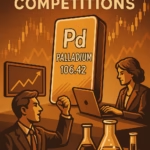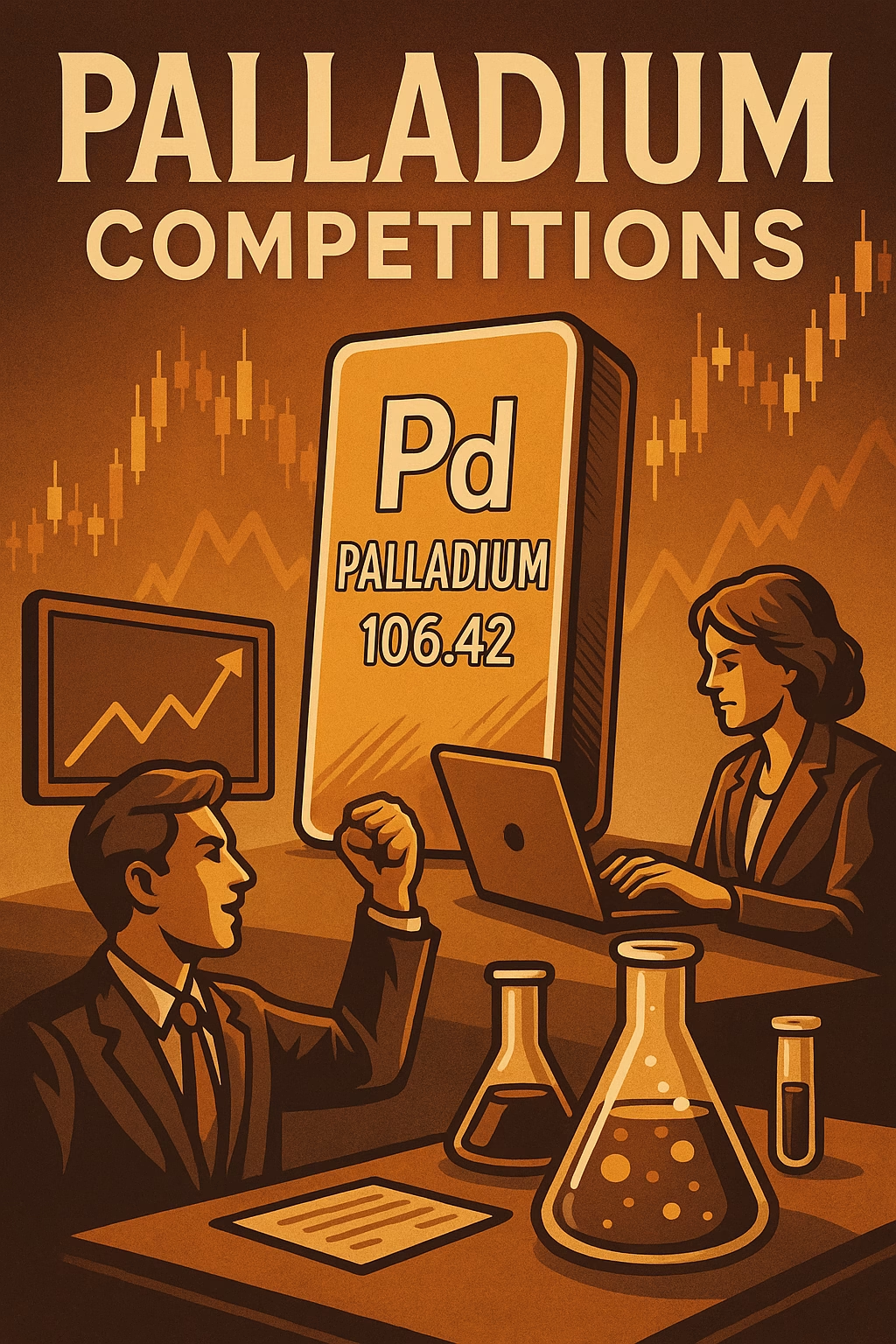So, palladium competitions, huh? I know, it’s not exactly something you hear people talk about every day. But, I think it’s worth exploring—more than just an oddity, it’s becoming a bigger part of how people engage with the commodity markets. I mean, who would’ve thought, right? A few years ago, if someone said to me, “Hey, you should check out palladium competitions,” I would’ve probably looked at them like they had two heads. But here we are, diving into a world that—honestly—can be a little thrilling and, yeah, maybe even a bit puzzling at times.
Let’s backtrack a bit. If you’ve ever found yourself fascinated by metals like gold or silver, you’re probably aware of how precious metals have long been a cornerstone of trading. But palladium? It’s that quiet, less-celebrated sibling in the precious metal family. Palladium is rare, used in industries from automotive to electronics, and—surprise—it’s getting attention in the world of competitions.
The Rise of Palladium Competitions
So, let’s start with the basics. What are palladium competitions? Well, in simple terms, they’re events or contests where participants compete based on trading palladium, predicting market trends, or maybe even creating the best investment strategy in this niche market. Sounds like something out of a futuristic financial thriller, right?
Palladium trading tournaments, or maybe we should call them palladium prize events, have started to gain momentum, not just in investment circles, but also among hobbyists who want to understand the complexities of commodities like palladium. These events range from friendly online competitions to more serious, investment-heavy contests where people can win—well, sometimes serious amounts of money or, even better, bragging rights.
It’s not just about trading either. You might see “palladium metal contests” where people compete to predict the price movements of palladium over a certain period, testing their knowledge of market trends, geopolitical impacts, and even supply chain disruptions. Think of it as a race—except, instead of running, you’re racing to read the signs of the market.
But here’s the twist: It’s not just the pros who get involved. I mean, yes, there are definitely metal traders who know the ins and outs of the commodity market, but there’s also a crowd that’s just curious or enthusiastic about precious metals. Palladium competitions, especially online, have opened up a space for anyone—from students to retirees—to test their knowledge and strategies. Pretty wild, right?
Investment Challenges in Palladium: What’s the Appeal?
Now, I think the real hook, for many, is the investment challenge aspect. If you’ve ever tried your hand at stock market simulations or even traded a few stocks here and there, the concept isn’t too far off. The difference? Well, palladium, unlike your usual stocks, has its own set of risks and rewards.
You see, palladium is unique. While gold and silver have been on the radar for centuries, palladium has only recently found its moment in the spotlight. It’s a metal that gets its value from industrial use—mainly in car engines, where it’s used to reduce harmful emissions. And, since the automotive industry is undergoing rapid change, particularly with electric vehicles gaining ground, the demand for palladium fluctuates in unexpected ways.
I think that’s what makes these competitions so interesting—this constant, shifting unpredictability. Traders and participants are trying to read the signals, predict market dips and peaks, and make educated moves, but the ride is wild. When it comes to palladium trading tournaments, you never really know which way the market will swing. One week it’s on the rise, the next it’s dipping down. These types of events mirror the real-life volatility and excitement that traders face every day.
But, on a more personal note, I’ve always found the rush of these competitions a bit like a mini treasure hunt—except instead of digging for gold, you’re trying to predict when the palladium price is going to spike. Sometimes, it feels like you’re betting on the weather—there’s only so much data you can rely on before you just have to trust your instincts.
The Community of Palladium Competitions
There’s also something to be said about the community aspect of these contests. And no, I don’t mean the typical “investor” crowd that talks about commodity market competitions in hushed tones at corporate events. I’m talking about the online forums, the chat groups, the communities of people who are just getting started or have a casual interest in palladium.
Some of these platforms host low-stakes precious metal contests or even virtual “buying and selling” environments where people can learn while they participate. I mean, sure, some may be in it for the potential cash prize, but the community’s also full of folks who genuinely want to understand the ups and downs of investing in palladium. It’s refreshing, in a way. There’s this unspoken, shared learning experience—kind of like a financial book club, but with real-time market data.
I guess, in the end, that’s part of what keeps this whole thing exciting. There’s a real sense of camaraderie among participants, even when things don’t go as planned.
Trends in Palladium Competitions
Now, I’m sure you’re wondering, “What’s next? Are palladium competitions just a passing trend, or are they here to stay?”
I think it’s safe to say they’re gaining traction. One reason could be that palladium, as a commodity, is having its moment. The automotive shift toward electric vehicles is reshaping the way palladium is used. And with markets responding to those changes, more people are looking for ways to engage with palladium beyond just a regular investment portfolio.
Another trend I’ve noticed is how accessible these palladium prize events have become. While they were once reserved for serious investors, now, anyone with an interest can join. You don’t need a massive trading account or insider knowledge to participate. There are even palladium metal contests with no buy-ins or entry fees. It’s an interesting shift, where the barrier to entry is lower, but the competition itself is more intense.
And let’s not forget the rise of digital platforms. I’ve seen a few startups and apps that host these competitions, creating virtual spaces for trading. It’s pretty wild, considering how far we’ve come. Remember the days when commodities were only traded through brokers on the phone? Now, you can get involved in real-time markets right from your smartphone. Feels like a sci-fi movie at times, but it’s happening.
Final Thoughts
I guess if I had to sum it up, palladium competitions are this intriguing mix of high-stakes trading, fun experimentation, and a dash of unpredictability. They attract the curious, the investors, and the dreamers, and they’re probably going to keep evolving as the market for palladium changes. It’s a space that’s growing, expanding, and offering new ways for people to dip their toes into the world of commodities.
If you’re considering getting involved, just know this: it’s not all about winning big prizes. For a lot of people, it’s the thrill of the market, the excitement of the challenge, and maybe even a bit of a gamble. But like anything in investing, there’s always a risk—so keep your head on straight and make sure you’re in it for the right reasons.
FAQ Section
- What exactly are palladium competitions?
Palladium competitions are events or challenges where participants trade, predict, or strategize based on palladium’s market movements. Some are for prizes, while others focus on learning and engagement. - Can I participate in palladium trading tournaments even if I’m new to trading?
Absolutely! Many competitions cater to beginners. Some have no entry fee, so you can test the waters without risking real money. - How do palladium prize events work?
In these events, participants predict or trade based on palladium’s price movements. Those who make the most accurate predictions or generate the best return on investment typically win prizes. - What’s the appeal of palladium over other precious metals?
Palladium is rarer than gold and silver, and its use in catalytic converters for cars gives it a unique market dynamic, especially with the rise of electric vehicles. - Are palladium competitions suitable for casual traders?
Yes, many competitions are designed to be accessible, allowing anyone with an interest in palladium to get involved and learn. - Can I win real money in these competitions?
Yes, depending on the competition, some offer cash prizes or other rewards. - Are palladium trading tournaments held online?
Many are held online, making them easy to access from anywhere.



![What Is Cybersecurity Meaning in Urdu? [2025 Edition]](https://techy-180.com/wp-content/uploads/2025/05/D1D0C4CF-E02C-4600-B280-4F927595A45E-150x150.avif)







